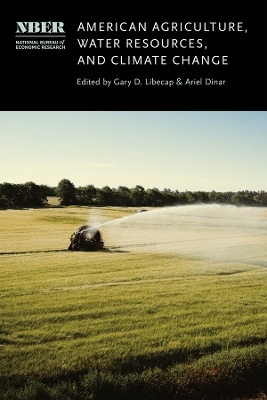
American Agriculture, Water Resources, and Climate Change
University of Chicago Press (Verlag)
978-0-226-83061-2 (ISBN)
Agriculture has been critical in the development of the American economy. Except in parts of the western United States, water access has not been a critical constraint on agricultural productivity, but with climate change, this may no longer be the case. This volume highlights new research on the interconnections between American agriculture, water resources, and climate change. It examines climatic and geologic factors that affect the agricultural sector and highlights historical and contemporary farmer responses to varying conditions and water availability. It identifies the potential effects of climate change on water supplies, access, agricultural practices, and profitability, and analyzes technological, agronomic, management, and institutional adjustments. Adaptations such as new crops, production practices, irrigation technologies, water conveyance infrastructure, fertilizer application, and increased use of groundwater can generate both social benefits and social costs, which may be internalized with various institutional innovations. Drawing on both historical and present experiences, this volume provides valuable insights into the economics of water supply in American agriculture as climate change unfolds.
Gary D. Libecap is professor emeritus in the Bren School of Environmental Science & Management at the University of California, Santa Barbara. Ariel Dinar is professor of environmental economics and policy at the University of California, Riverside.
Acknowledgments
Introduction
Gary D. Libecap and Ariel Dinar
1. The Economics of Climatic Adaptation: Agricultural Drainage in the United States
Eric C. Edwards and Walter N. Thurman
2. Estimating the Effect of Easements on Agricultural Production
Nicole Karwowski
3. The Cost-Effectiveness of Irrigation Canal Lining and Piping in the Western United States
R. Aaron Hrozencik, Nicholas A. Potter, and Steven Wallander
4. Center Pivot Irrigation Systems as a Form of Drought Risk Mitigation in Humid Regions
Daniel Cooley and Steven M. Smith
5. Perceived Water Scarcity and Irrigation Technology Adoption
Joey Blumberg, Christopher Goemans, and Dale Manning
6. Climate, Drought Exposure, and Technology Adoption: An Application to Drought-Tolerant Corn in the United States
Jonathan McFadden, David Smith, and Steven Wallander
7. Cover Crops, Drought, Yield, and Risk: An Analysis of US Soybean Production
Fengxia Dong
8. Climate Change and Downstream Water Quality in Agricultural Production: The Case of Nutrient Runoff to the Gulf of Mexico
Levan Elbakidze, Yuelu Xu, Philip W. Gassman, Jeffrey G. Arnold, and Haw Yen
9. Nutrient Pollution and US Agriculture: Causal Effects, Integrated Assessment, and Implications of Climate Change
Konstantinos Metaxoglou and Aaron Smith
10. The Political Economy of Groundwater Management: Descriptive Evidence from California
Ellen M. Bruno, Nick Hagerty, and Arthur R. Wardle
11. Estimating the Demand for In Situ Groundwater for Climate Resilience: The Case of the Mississippi River Alluvial Aquifer in Arkansas
Kent F. Kovacs and Shelby Rider
Author Index
Subject Index
| Erscheinungsdatum | 21.12.2023 |
|---|---|
| Reihe/Serie | National Bureau of Economic Research Conference Report |
| Zusatzinfo | 150 line drawings, 68 tables |
| Sprache | englisch |
| Maße | 152 x 229 mm |
| Gewicht | 680 g |
| Themenwelt | Kunst / Musik / Theater |
| Naturwissenschaften ► Biologie ► Ökologie / Naturschutz | |
| Technik | |
| Wirtschaft ► Betriebswirtschaft / Management ► Unternehmensführung / Management | |
| Weitere Fachgebiete ► Land- / Forstwirtschaft / Fischerei | |
| ISBN-10 | 0-226-83061-6 / 0226830616 |
| ISBN-13 | 978-0-226-83061-2 / 9780226830612 |
| Zustand | Neuware |
| Informationen gemäß Produktsicherheitsverordnung (GPSR) | |
| Haben Sie eine Frage zum Produkt? |
aus dem Bereich


